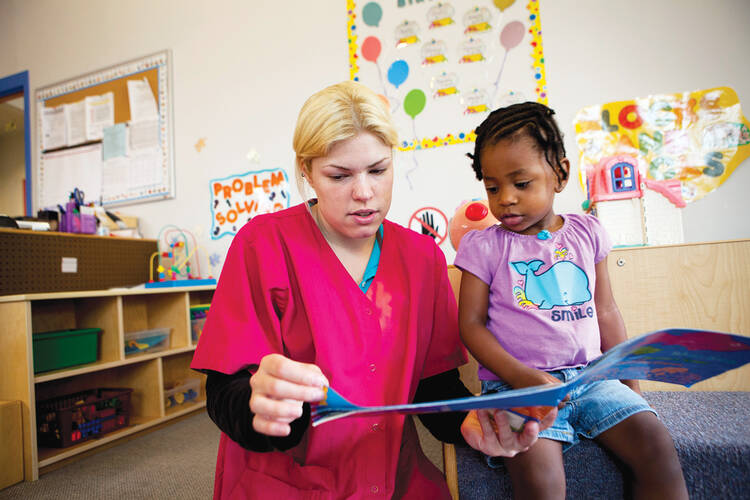Catholic advocates are pressing Congress to make the needs of poor and vulnerable people a priority as legislators hammer out a federal spending plan for 2016. They want to prevent trillions of dollars in social services spending from disappearing over the next decade as Congress seeks to balance the federal budget and reduce the nation’s growing debt.
“There are millions of people at stake in these decisions,” said Brian Corbin, senior vice president for social policy at Catholic Charities USA, which has joined with Catholic Relief Services and the U.S. Conference of Catholic Bishops in meetings on Capitol Hill. “They all have a name and a face and based on our principle of human dignity, that name and that face and that family, those really are important to making issues of poverty real.”
The legislative push began in February as advocates learned of Republican plans to remake the way social services like Medicaid and food stamps are funded. In meetings with individual members of Congress, Catholic advocates have stressed that the needs of hungry, homeless and unemployed people must be the country’s highest priority.
In a letter to Congress on Feb. 27, the chairmen of the U.S. bishops’ Committee on Domestic Justice and Human Development and the Committee on International Justice and Peace reiterated that a budget is a moral document and that the needs of poor people are utmost despite the economic pressures posed by “future unsustainable deficits.”
The federal budget “cannot rely on disproportionate cuts in essential services to poor persons,” wrote Archbishop Thomas G. Wenski of Miami and Bishop Oscar Cantú of Las Cruces, N.M. “It requires shared sacrifice by all, including raising adequate revenues, eliminating unnecessary military and other spending, and addressing the long-term costs of health insurance and retirement programs fairly.”
As the bishops’ letter was circulating, Representative Tom Price, of Georgia, and Senator Mike Enzi, of Wyoming, both Republican chairpersons of Congress’s respective budget committees, were crafting spending plans that called for balancing the federal budget within a decade, with the goal of tackling the country’s $18 trillion debt.
The House budget, called “A Balanced Budget for a Stronger America,” cuts nearly $5.5 trillion in spending from current projections over the next decade. Specific spending reductions include Medicaid and the State Children’s Health Insurance Program ($913 billion); Medicare ($148 billion); food stamps ($140 billion); housing, nutrition, job training, elderly services and other discretionary programs ($759 billion); and the repeal of the Affordable Care Act ($2.1 trillion). The Senate plan was less specific, but identified only nonmilitary programs for reductions.
Both budgets call for increases in military spending over the decade, while immediately adding tens of billions of dollars for overseas contingency operations for the wars in Afghanistan and Iraq.
Sister Marge Clark, a domestic issues lobbyist at Network, said the needs of poor and vulnerable people were being pushed aside in the budget plans.
“We’re really frustrated because the House leadership is talking about doing good things for the middle class, and yet everything we see them doing is bad for the middle class and particularly bad for those struggling at the margins,” said Sister Clark, a Sister of Charity of the Blessed Virgin Mary.








